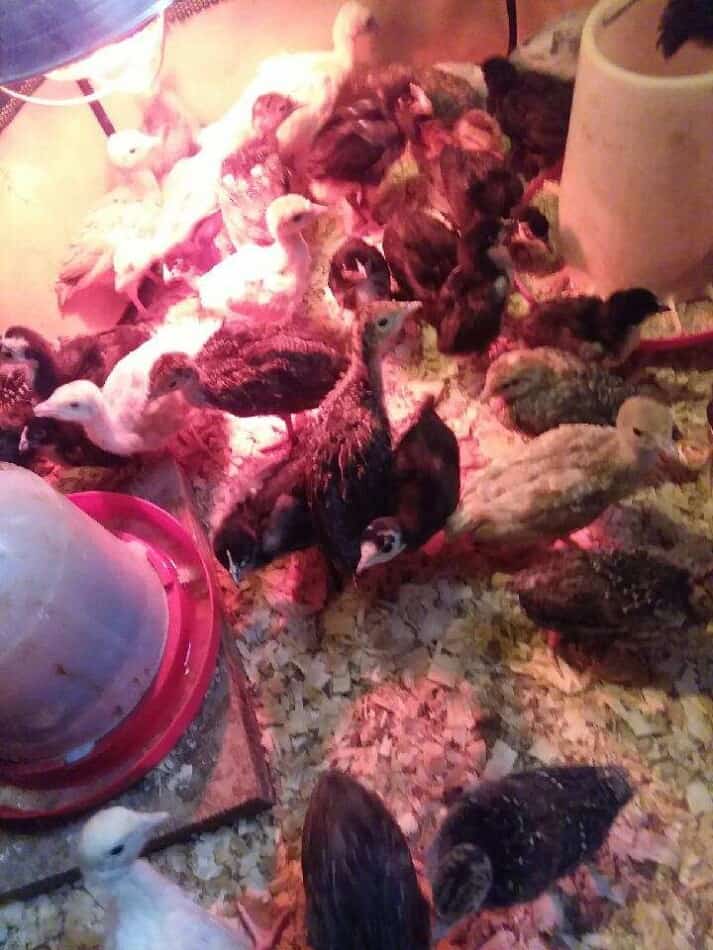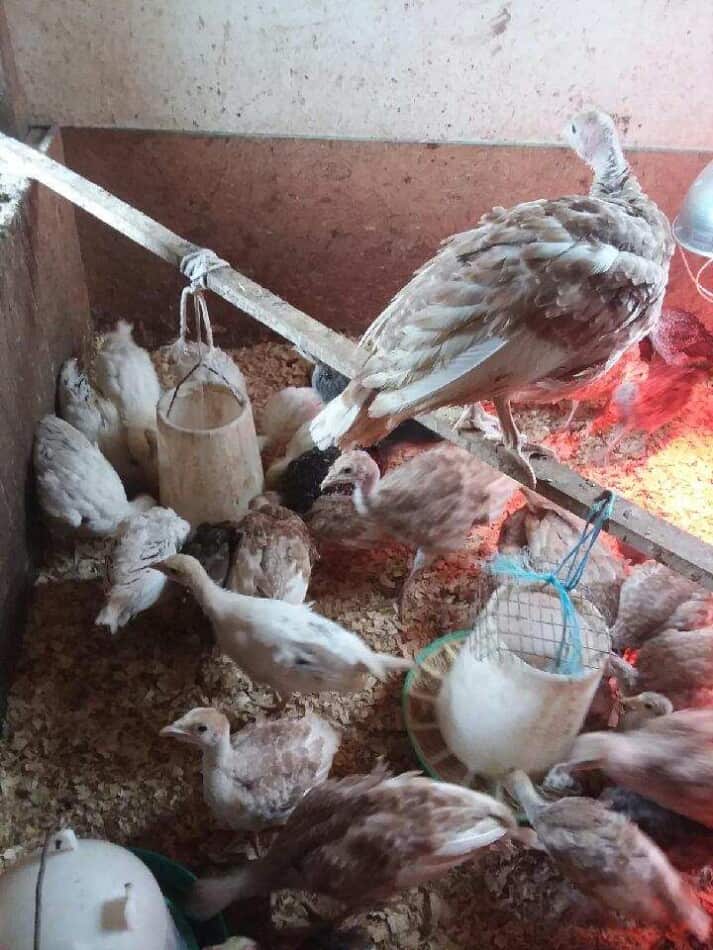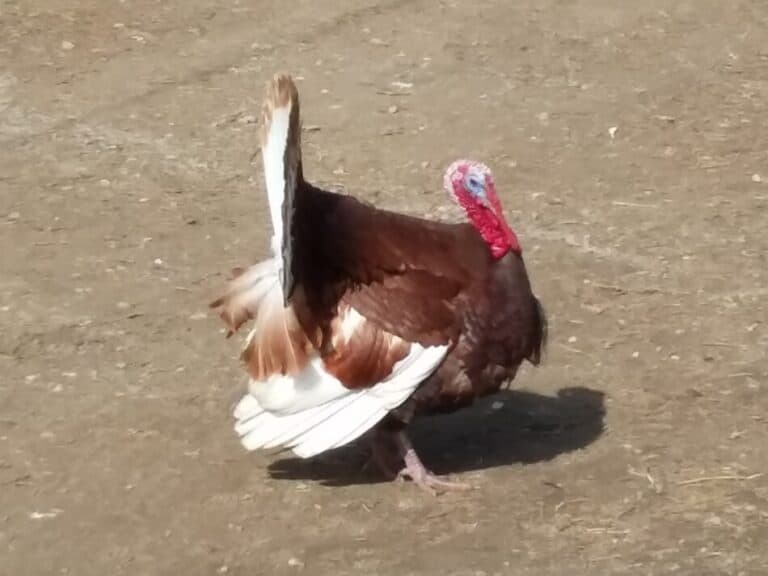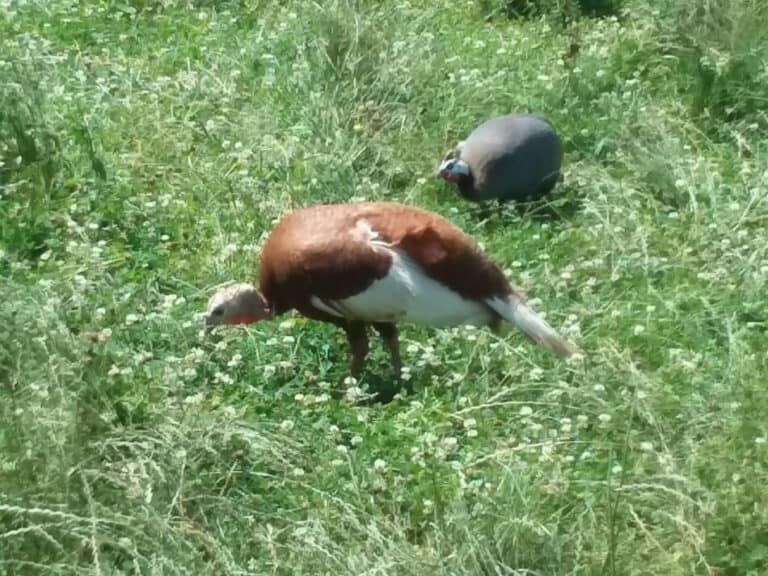Are Turkey Poults Easy To Raise?

Considering raising your own turkeys this year? Turkeys are fun to raise and are an amazingly tasty choice for dinner!
What will it take to get these turkey poults raised and will raising them be hard or easy?
Raising turkey poults is more exacting than raising other day old poultry. When poults are provided with exactly what they need, turkey poults are easy to raise.
Is Raising Turkeys For Meat Worth It? is an article I wrote listing out the budget for raising your own turkeys for meat versus buying turkeys some one raises for you, including what you can expect to spend while raising your poults.
Turkey poults have specific needs that must be met
Turkey poults have the reputation of being more difficult to raise than most other day old poultry. This is mostly due to the folks raising them not providing for all of the poults’ needs exactly, meaning that this is a management problem.
While I would not say turkeys are hard to raise, I would not put them in the easy raise category either. I would say turkeys are in the “must be raised in a specific manner” category. This doesn’t mean hard or easy, it means exact.
You just don’t have the wiggle room in your management with turkeys that you would with hatchlings that have more ability to bounce back, like ducklings.
I think the real kicker with poults is that you don’t get a second chance to do it right, and when you mess up it ususally is a big deal affecting a large portion of the poults. This is one of those all or nothing deals.
Hopfully all of this “exact” stuff doesn’t keep you out of turkeys, they are a fun and interesting bird. But they are a bit different than most of the other young poultry you have raised and that can throw people off. But it is doable.
Know the tricks to get poults eating and drinking right away
One of the most common challenges new turkey raisers have is to get the new poults started eating and drinking. Poults seem to be one of the more frustrating day old poultry, but there’s no need to have problems with your poults.
This is one of the areas that is frustrating for new turkey raisers. Good news, you can do just a few things that are easy and cheap to make sure your turkeys are eating and drinking well.
Read 4 Easy Ways To Get Turkey Poults To Eat and Drink for the tips on getting off to a great start with your poults. Read this article and do as many of the suggestions as possible.
All turkey poults need to start off in a brooder
All turkey poults need to start off in the brooder. Make sure your brooder is set up before your poults arrive and have the heat on, so you put poults into a warm brooder as soon as you get them home.
Make sure your brooder is easy to navigate for the poults and has feed and water positioned so that the poults can’t help but run into it, no matter which direction they walk from the heat.
Turkey poults need high protein feed
It can be tempting to just give your poults chicken feed, you’ve probably got some around, anyway. Don’t do it. Chicken feed will not have anywhere near the protein levels needed for your turkeys!
Turkey poults need a high protein starter feed. Anything less will result in poor health of the poults.
We use gamebird starter and grower for turkeys. The gamebird feeds are made for pheasants and quail, but work well for turkeys, too.
The down side of gamebird feed it the price, it’s expensive compared to other feeds that are available. But it works, so we figure that it’s better to pay a bit more for great feed and great results than cheap out and hope it works.
Turkeys must be given a high protein unmedicated feed and kept on a high protein feed until they are grown. As your poults grow, the protein needed will drop a little, but it will still be higher than the same age chickens.
The need for high protein feeds through out growth is especially critical for the super fast growing broad breasted turkeys. The higher protein keeps them growing a strong skeletal system to support all of that weight.
Don’t get me wrong, the heritage birds need the high protein as well, it’s just less dramatic weight gain in these birds.
If you are wondering how much feed your turkeys will need, consider reading my article How Much Feed Does It Take To Raise Turkey Poults.
Fully feathered turkey poults can go outside
Do not put your turkey poults outside until they are fully feathered. Even then, it needs to be in a small pen that is attached to the brooder.
Before you let your turkey poults out, you’ll need to have been reducing the brooder temperature by 5 degrees every week to get to ambient temperature.
The idea being that you’ll be able to turn out the poults when the brooder temperature matches the outside temperature for the night.
Matching the temperature for the day is fine if it is a nice, sunny day, the poults have all of their feathers, you have them in a small, well fenced area and you’ll be putting them back in the brooder for the night.
Be sure you spend some time watching the poults, you’ll want to make sure they feel comfortably curious in their new pen and you can head off problems, like escaping. You’ll be surprised the wire spacings they can fit though!
If you are expecting storms, keep the poults inside!
Weather is a huge variable here, mainly rain and wind. If your poults get caught out in the rain, you’ll have a serious problem.
Poults do not handle stress well and getting chilled in the rain is very stressful. An event like this is likely to cause any poults that end up wet and cold to die. Poults do not have any “bounce back” ability.
I’m sure your plan is to let the turkeys out to roam, which is a good plan for when your turkeys are adults. This is not a good plan for young turkeys. They are more immature than they look, so need more care than you would think.
Young turkeys are not as mature as they look
It is often the case that we tend to equate size with ability or maturity. This will come back to bite you when you are raising turkeys.
While the poults are bigger for their age than other birds you may have raised, they are not more capable than those other birds. The poults are just bigger, that’s it, not more mature or able to take care of themselves.
For some reason, poults seem to be more prone to making poor decisions than other young birds. Poults do not have the “sense” that you would expect from another bird of their size.
Now that you know this tendency for poults to do “dumb” things, you also need to realize that it’s your job as their keeper to make sure the poults are not given the opportnity to make these poor decisions.
Turkey poults must be kept from making dumb decisions. This means that when you finally turn them outside, but them in a small outdoor pen, make the entrance to their indoor pen/brooder be super easy to see and get through.
You don’t want the weather to change and a few of the poults miss the entrance to get inside. I know this sounds like overkill, but for these guys it’s right on the money.
You’ll also notice I wrote small outdoor pen, that’s key. The first few times outside must be super easy and basically idiot proof. If you let your poults out to roam as they please, you won’t be happy with the results.
Of course, you can gradually increase the area you give the poults as long as they seem capable of handling it. As they grow, the poults will become more capable, but until they are full size you need to be thinking ahead!
If all of this sounds like something you don’t want to worry about, you’ll have a hard time with your poults. You have to worry about and fix this kind of stuff when you are dealing with young turkeys.
Turkey poults are not as durable as other day old poultry
This somewhat circles back to the size thing, but turkey poults are not as durable as other hatchlings that you may have raised in the past.
You have to be on the lookout for potential hazards and correct the situation before there is a problem, waiting to fix something after you see negative results will equal death losses in your poults.
I know that sounds unforgiving, but that’s the nature of the birds you are dealing with. Baby turkeys do not have any wiggle room built in for management based mistakes.
Adult turkeys are easy to keep
Adult turkeys are easy, poults are much more specific in their needs.
Your adult turkeys are super easy to have around, the only things you’ll need to watch out for here is predators and the turkeys wandering into the road, which is easily fixed with a fence.
Predators seem to love turkeys, sad but true. If you are in a high predation area, you’ll have to be on your game to keep your birds around.
An easy solution here is to lock the birds up at night in a predator proof coop or pen.
Anytime we sell turkeys to someone and we hear back that it did not work out for them the answer is nearly always predators, with the occasional hit on the road story.
The great news here is that you can keep your turkeys around with not too much work, all you need to do is keep them safe from predators and keep them on your property.
Brooding Turkeys Successfully is a great article by Dan Cunningham of the University of Georgia that covers all the bases, if you are looking for more of an overview on poults.
Photo credit: Echoinghills Farm, this is a picture of Echoinghills Farm’s turkey brooder. There are heritage poults as well as some chicks.


